Related Research Articles
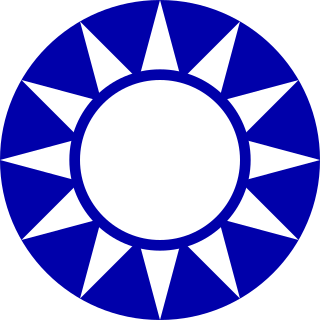
The Kuomintang (KMT), also referred to as the Guomindang (GMD), the Nationalist Party of China (NPC) or the Chinese Nationalist Party (CNP), is a major political party in the Republic of China, initially based on the Chinese mainland and then in Taiwan since 1949. The KMT is a centre-right to right-wing party and the largest in the Pan-Blue Coalition. Its primary rival is the Democratic Progressive Party (DPP) and its allies in the Pan-Green Coalition. As of 2024, the KMT is the largest single party in the Legislative Yuan. The current chairman is Eric Chu.
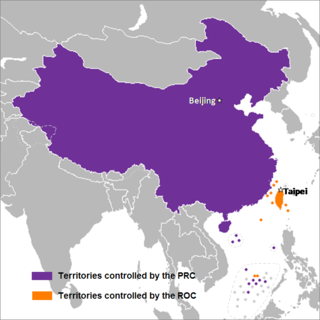
Chinese unification, also known as Cross-Strait unification or Chinese reunification, is the potential unification of territories currently controlled, or claimed, by the People's Republic of China and the Republic of China ("Taiwan") under one political entity, possibly the formation of a political union between the two republics. Together with full Taiwan independence, unification is one of the main proposals to address questions on the political status of Taiwan, which is a central focus of Cross-Strait relations.
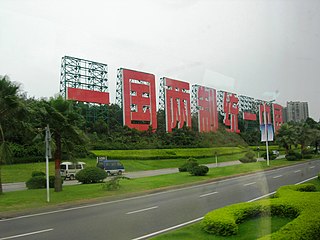
"One country, two systems" is a constitutional principle of the People's Republic of China (PRC) describing the governance of the special administrative regions of Hong Kong and Macau.
The controversy surrounding the political status of Taiwan or the Taiwan issue is an ongoing dispute on the political status of Taiwan, currently controlled by the Republic of China (ROC). This dispute arose in the mid-twentieth century.
The term One China may refer, in alphabetical order, to one of the following:
- there is only one China;
- the PRC serving as the sole legitimate government of China;
- Taiwan is an inalienable part of China.
- there is only one China;
- mainland and Taiwan belong to one China;
- the sovereignty of that one China is indivisible.

The United Front Work Department (UFWD) is a department of the Central Committee of the Chinese Communist Party (CCP) tasked with "united front work." It gathers intelligence on, manages relations with, and attempts to gain influence over elite individuals and organizations inside and outside mainland China, including in Hong Kong, Taiwan, and in other countries.

The Anti-Secession Law is a law of the People's Republic of China, passed by the 3rd Session of the 10th National People's Congress. It was ratified on March 14, 2005, and went into effect immediately. President Hu Jintao promulgated the law with Presidential Decree No. 34. Although the law, at ten articles, is relatively short, Article 8 formalized the long-standing policy of the PRC to use military means against Taiwan independence in the event peaceful means become otherwise impossible. The law does not explicitly equate "China" with the People's Republic of China.
The 1992 Consensus is a political term referring to the alleged outcome of a meeting in 1992 between the semiofficial representatives of the Chinese Communist Party (CCP)-led People's Republic of China (PRC) of mainland China, and the Kuomintang (KMT)-led Republic of China (ROC) of Taiwan. They are often credited as creating a diplomatic basis for semi-official cross-strait exchanges which began in the early 1990s and is a precondition set by the PRC for engaging in cross-strait dialogue.

The Taiwan Affairs Office is an administrative agency under the State Council of the People's Republic of China (PRC). It is responsible for Cross-Strait relations and sets and implements guidelines and policies related to the Republic of China (Taiwan). Under the "one institution with two names" arrangement, it is equivalent to the Chinese Communist Party's Taiwan Work Office under the CCP Central Committee; the party title is used for party-to-party interactions with Taiwan.

The 2005 Pan–Blue visits to mainland China were a series of groundbreaking visits by delegations of the Kuomintang (KMT) and their allied Pan-Blue Coalition to mainland China. They were hailed as the highest level of exchange between the Chinese Communist Party and the Kuomintang since Chiang Kai-shek and Mao Zedong met in Chongqing, China on August 28, 1945.

Cross-Strait relations are the relations between China and Taiwan.
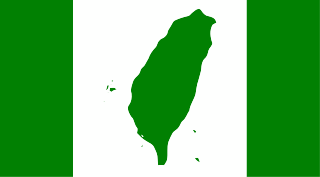
Taiwanese nationalism is a nationalist movement which asserts that the Taiwanese people are a distinct nation. Due to the complex political status of Taiwan, it is strongly linked to the Taiwan independence movement in seeking an identity separate from China. This involves the education of history, geography, and culture from a Taiwan-centric perspective, promoting native languages of Taiwan such as Taiwanese Hokkien, Hakka, and indigenous languages, as well as reforms in other aspects.
The united front is a political strategy of the Chinese Communist Party (CCP) involving networks of groups and key individuals that are influenced or controlled by the CCP and used to advance its interests. It has historically been a popular front that has included eight legally-permitted political parties and people's organizations which have nominal representation in the National People's Congress and the Chinese People's Political Consultative Conference (CPPCC). Under CCP general secretary Xi Jinping, the united front and its targets of influence have expanded in size and scope.

Phoenix Television is a majority state-owned television network that offers Mandarin and Cantonese-language channels that serve mainland China, Hong Kong, Macau and other markets with substantial Chinese-language viewers. It is headquartered in Shenzhen and Hong Kong. It is also registered in Cayman Islands.

The Central Leading Group on Hong Kong and Macau Affairs is an internal policy coordination group of the Central Committee of the Chinese Communist Party (CCP), reporting to the CCP Politburo, in charge of supervising and coordinating Beijing's policy towards the Special Administrative Regions of Hong Kong and Macau.

The (Chinese) Patriot Alliance Association, abbreviated PAA, also known as the Concentric Patriotism Alliance or the Concentric Patriotism Association of China is a pro-Chinese Communist Party organization that supports the unification of Taiwan and mainland China. The PAA is described as "far-right" or "conservative", but PAA is a pro-Chinese Communist Party, it is different from the mainstream conservatives including the Kuomintang/Pan-Blue Coalition, who claim Republic of China legitimacy.
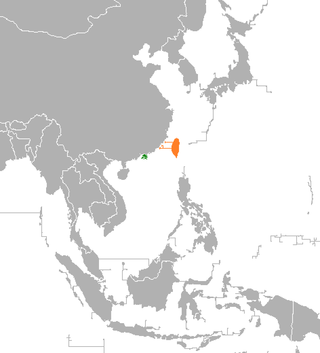
Relations between the government of Hong Kong and the Republic of China (Taiwan) encompass both when the Republic of China controlled mainland China, and afterwards, when the Republic of China fled to Taiwan.

The retreat of the government of Republic of China to Taiwan, also known as the Kuomintang's retreat to Taiwan or the Great Retreat in Taiwan, refers to the exodus of the remnants of the then-internationally-recognized Kuomintang-ruled government of the Republic of China (ROC) to the island of Taiwan (Formosa) on December 7, 1949, after losing the Chinese Civil War in the Chinese mainland. The Kuomintang, its officers, and approximately 2 million ROC troops took part in the retreat, in addition to many civilians and refugees, fleeing the advance of the People's Liberation Army of the Chinese Communist Party (CCP). The CCP, who now effectively controlled most of Mainland China, spent the subsequent years purging any remnant Nationalist agents and bandits in western and southern China, solidifying the rule of the newly established People's Republic of China.

Chinese imperialism refers to the expansion of China's political, economic, and cultural influence beyond the boundaries of the People's Republic of China. Depending on the commentator, it has also been used to refer to its artificial islands in the South China Sea and the persecution of Uyghurs in China. Although there has not been a long-standing imperial regime in China since the 1911 Revolution and the country is officially a People's Republic, some refer to China as an imperialist country. This includes socialist parties in the Pacific such as the New People's Army, Japanese Communist Party, some Maoist parties, and the New Left. China's relations with Africa have also been accused of being "neo-colonialism".
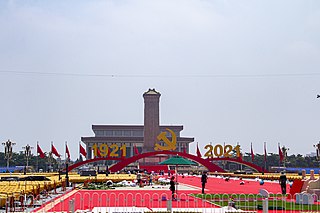
Celebrations of the 100th anniversary of the founding of the Chinese Communist Party, or the Centennial of the Chinese Communist Party, were held on 1 July 2021 in Beijing to celebrate the centennial of the founding of the Chinese Communist Party (CCP), which has been the sole governing political party of the People's Republic of China (PRC) since 1949. CCP General Secretary Xi Jinping, as the guest of honor, delivered a speech and presented the Order of July the First order of honour to CCP members who have made significant contributions. Premier Li Keqiang served as the official host of the event.
References
- ↑ Cole, J. Michael (27 December 2019). "Taiwan and CCP political warfare: A blueprint". Sinopsis. Archived from the original on 30 December 2019. Retrieved 16 January 2022.
- ↑ Hong, Brendon (28 October 2020). "China's Real Invasion of Taiwan Has Already Started". The Daily Beast . Archived from the original on 28 October 2020. Retrieved 29 October 2020.
- ↑ McCarthy, Simone (1 August 2022). "'Win hearts and minds' in Taiwan and Hong Kong, Xi urges Communist Party". CNN . Archived from the original on 1 August 2022. Retrieved 1 August 2022.
- ↑ Tsang, Steve Yui-Sang; Tien, Hung-mao (1999). Democratization in Taiwan: Implications for China. Macmillan. ISBN 978-0-333-73783-5. Archived from the original on 27 August 2023. Retrieved 4 November 2016.
- ↑ Yu-fu, Chen; Chin, Jonathan (5 September 2021). "Beijing boosts influence drive: report". Taipei Times . Archived from the original on 6 September 2021. Retrieved 5 September 2021.
- ↑ Cooper, Sam. "Beijing uses organized crime to interfere in Taiwan's elections, and likely does in Canada: Taiwanese official". www.thebureau.news. Archived from the original on 13 October 2023. Retrieved 6 September 2023.
- ↑ "Notes from Central Taiwan: Imaginings of another Taiwan". Taipei Times . 8 May 2023. Archived from the original on 28 June 2023. Retrieved 30 April 2024.
Today we know terms like "united front" in the context of Chinese imperialism and expansionism, but in the 1930s the term had another meaning: it encapsulated the desire of Asians struggling to form a "united front" against external imperialism.
- ↑ "Civilian group from mainland China to take more prominent role in cross-strait affairs". South China Morning Post . 7 May 2017. Archived from the original on 15 May 2023. Retrieved 27 August 2023.
- ↑ Groot, Gerry (19 October 2022). "The Life and Death of United Front Promises From Revolution to (Re)-Unification Past, Present and Future". China Brief. Jamestown Foundation. Archived from the original on 19 October 2022. Retrieved 19 October 2022.
- ↑ Purbrick, Martin (12 April 2023). "United Front Work and Beyond: How the Chinese Communist Party Penetrates the United States and Western Societies". Jamestown Foundation . Archived from the original on 15 April 2023. Retrieved 15 April 2023.
- ↑ "Some Taiwanese Youtubers on CCP payroll: intelligence chief". Central News Agency (Taiwan) . Archived from the original on 17 May 2022. Retrieved 17 May 2022.
- ↑ "China to increase 'united front' efforts: MAC report". Taipei Times . 16 May 2023. Archived from the original on 5 June 2023. Retrieved 19 May 2023.
- ↑ "China-Taiwan Weekly Update, July 27, 2023". Critical Threats. American Enterprise Institute. Archived from the original on 29 July 2023. Retrieved 27 August 2023.
- ↑ Shan, Shelley (29 November 2023). "Suspects running China-funded tours". Taipei Times . Archived from the original on 3 December 2023. Retrieved 2 December 2023.
- ↑ "First charge laid over China voter tours". Taipei Times . 27 December 2023. Archived from the original on 14 January 2024. Retrieved 28 December 2023.
- ↑ "Chinese interference 'looms large' over Taiwan's presidential poll". Radio Free Asia . Archived from the original on 22 January 2024. Retrieved 6 December 2023.
- ↑ Hioe, Brian (7 December 2023). "Subsidized trips for borough chiefs and constituents to travel to China comes under scrutiny". New Bloom. Archived from the original on 7 December 2023. Retrieved 7 December 2023.
- ↑ Hsiao, Russell (23 August 2023). "Personnel Changes at the PRC's Organs for Taiwan Intelligence Analysis". Global Taiwan Institute. Archived from the original on 3 November 2023. Retrieved 4 September 2023.